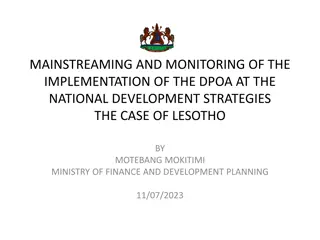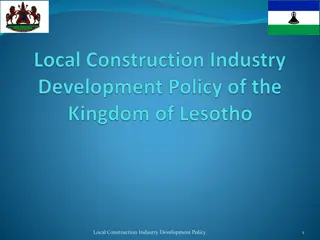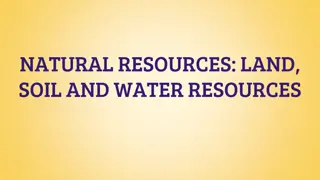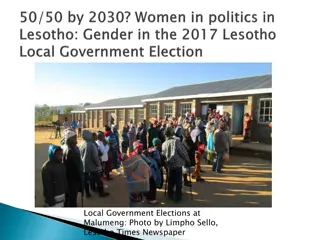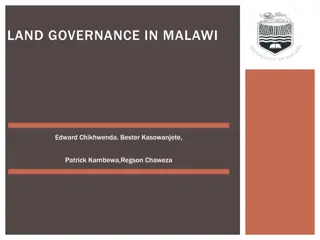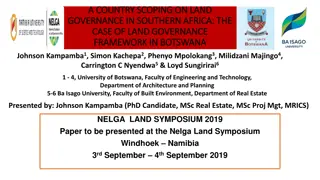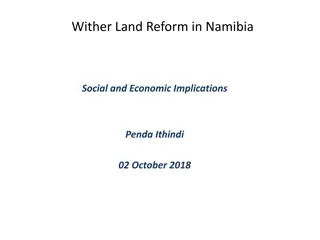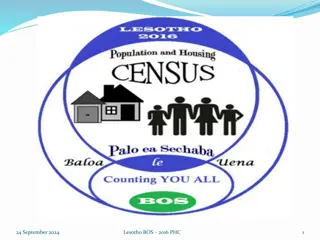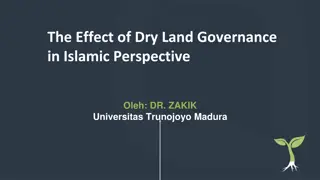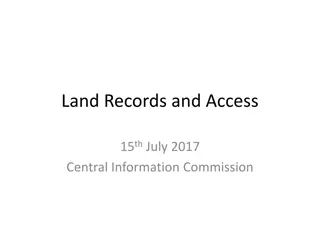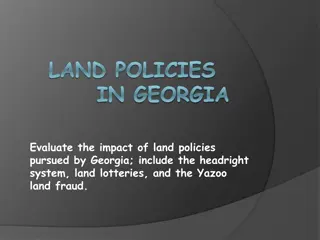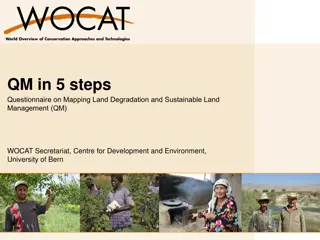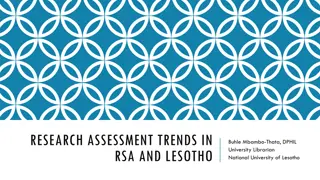Land Governance in Lesotho: An Overview
This paper discusses the institutional frameworks, legal frameworks on land tenure, and land registration processes in Lesotho. It covers the roles of central and local government institutions, as well as informal actors like customary chiefs. The legal framework on land tenure, including statutory and customary tenures, and recent reforms in land registration are highlighted.
Download Presentation

Please find below an Image/Link to download the presentation.
The content on the website is provided AS IS for your information and personal use only. It may not be sold, licensed, or shared on other websites without obtaining consent from the author.If you encounter any issues during the download, it is possible that the publisher has removed the file from their server.
You are allowed to download the files provided on this website for personal or commercial use, subject to the condition that they are used lawfully. All files are the property of their respective owners.
The content on the website is provided AS IS for your information and personal use only. It may not be sold, licensed, or shared on other websites without obtaining consent from the author.
E N D
Presentation Transcript
Land Governance in Lesotho Paper prepared for presentation at the 2019 Land Governance in Southern Africa Symposium The NUST-NELGA Hub - Windhoek, Namibia, September, 2018
Institutional Framework for Land Governance and Administration Formal Framework Central Government: MOLG Policy formulation and coordination MTEC Department of Environment MFLR Department of Range Management
Institutional Framework for Land Governance and Administration Local Government Institutions land management functions as per Local Government Act 1997 Land management within jurisdiction of each Council Municipal and Urban Councils Community Councils
Institutional Framework for Land Governance and Administration Informal Actors Field Owners and Customary Chiefs in peri- urban areas - Land planning and allocation Chiefs provide legitimacy to illegal subdivision through back- dated Form C (unregistered certificate used by Chiefs as proof of customary allocation certificates
LEGAL FRAMEWORK ON LAND TENURE Land Tenure Regime There are two major tenure regimes in Lesotho: statutory (leasehold) and customary tenures. Statutory: Based on land allocated by legitimate authority (central and local) Based on registered title in the form of lease Customary: Based on allocation by traditional authority Communal ownership and non-registered
LEGAL FRAMEWORK ON LAND TENURE Land Registration The subject of recent land reforms in Lesotho through the Land Act 2010 and establishment of LAA. Registration process has improved from over 12 months to register property to 60 days. Land registration through systematic and sporadic regularization Land registration has increased four fold in urban areas, unchanged in rural areas
LEGAL FRAMEWORK ON LAND TENURE Expropriation Constitution protects citizens from arbitrary seizure of movable and immovable property without due process and payment of full compensation Part IX of Land Act 2010 outlines provisions for the expropriation of land for public purpose or public interest uses At the moment there are numerous compensation systems in Lesotho
LEGAL FRAMEWORK ON LAND TENURE Equity and Non-discrimination Under Lesotho s customary law, women could not own fixed property, including land, as of right, but can only do so through their husbands or fathers This corrected by the following pieces of legislation: The Legal Capacity of Married Persons Act of 2006 (Act 9 of 2006) equality of married persons Land Act 2010 (Act 8 of 2010) increased land rights for women
LEGAL FRAMEWORK ON LAND TENURE Land Markets Formal markets generally trade in real rights, (leaseholds) Informal markets deal in rights (entitlements) that derive from a myriad of socially sanctioned processes In urban Lesotho, over 70% of the population obtain land through informal means
LAND DISPUTE RESOLUTION Land dispute in Lesotho are settled through two mechanisms, namely mediation and litigation Mediation - intended to reduce the cost and time required to resolve land disputes, Litigation - The Land Court is a specialised court and is a division of the High Court of Lesotho. The District Land Courts are subordinate courts that deal with land related disputes at district level
VALUATION AND TAXATION In Lesotho property tax is legislated by the Valuation and Rating Act 1980 (Act No. of 1980). Property tax is only be levied on properties that are located urban areas, and that have been designated as ratable areas by the Minister responsible for lands Maseru Municipality is the only designated a Valuation and Rating Authority that levies property tax, With a rating coverage of only 16 % of the municipality
LAND USE PLANNING AND CONTROL There are two frameworks that govern land use planning in Lesotho Urban based planning is based on legal framework of the Town and Country Planning Act of 1980 (Act No. 11 of 1980) Presently there are 12 urban centers designated as Planning Areas Planning Authority has the legal mandate to prepare development plans for areas that are designated as Planning Areas Out of 12 Planning Areas only 5 have had Development plans but non complies with the legal framework. Rural based planning is not based on any legal framework, but on a land use planning manual. (64 Community Councils) LUSP process has remained in the pilot phase in Community councils in 7 districts Challenges are namely institutional weaknesses, centralized planning system, and lack of finance.
LAND USE PLANNING AND CONTROL Development Permits the principal legislation that regulates and guides the development permits: Town and Country Planning Act (1980): requires that all developers to seek permission before commencement of development Building Control Act 1995 (Act No. 8 of 1995): is intended to regulate building standards in order to ensure structural safety Challenges: - councils are ill-equipped to deal with due to limited physical and financial resources - widespread corruption
LAND USE PLANNING AND CONTROL Climate Change and Environmental Management Environment Act 2008 (Act No. 10 of 2008) seeks to develop policies designed to protect and enhance the natural environment of Lesotho. The Lesotho National Climate Change Policy 2017 - 2027,) aims to mainstream climate change into future land use plans
LAND USE PLANNING AND CONTROL Enforcement of Environmental Protection establishment of nature conservation areas, and enforcement of environmental coordination is problematic, as some ministries are already performing such function.
MANAGEMENT OF PUBLIC LAND Public Land Inventory There is no known inventory of public land in Lesotho
LAND INFORMATION Public Provision of Land Information Datasets of cadastral data are mainly in the form of shapefiles. The software that is mainly used within the LAA to manipulate this data is ArcGIS. The cadastral information is used for the purposes of relating plots to owners through the registration of leases. The land information system is not very reliable because not all land plots in the country are formally registered
LAND INFORMATION Land Administration Services Maps can be inspected at the LAA offices free of charge, and can be made available at a fee,
KEY CHALLENGES IN LESOTHO Despite the land reforms instituted by the Land Act of 2010 framework of land administration, land management remains chaotic at best. Reviews show that none of these plans have been implemented as a result of: lack of political, administrative and financial support, lack of institutional capacity at virtually all levels of government. most land in rural areas is neither registered nor recorded in any form. The proportion of land reported as registered
KEY CHALLENGES IN LESOTHO most land in Lesotho is neither registered nor recorded in any form. The proportion of land reported as registered is only 2% Incomplete registration has direct bearing on land market activity
KEY CHALLENGES IN LESOTHO Although the Land Act 2010 and the Legal Capacity of Married Persons Act 2006 (Act 9 of 2006) have removed the minority status of women with respect to property rights the minority status of women still persists as a result of cultural practices. significant factor which undermines the practical enforcement of gender equality is Lesotho s legal pluralism



